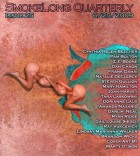From where did the idea of this incredible piece originate?
Well, it goes back to Oliver Cromwell, really, and Elizabeth the 1st, Queen of England, and before that too. Because they imposed the English language on Ireland for hundreds of years and Irish people like me responded by screwing with the language as much as we could. I mean screwing in a romantic sense, really. Not political. But it’s true nonetheless: we talk backwards and sideways. We put words in for the hell of it. Which is why, when this phrase ‘Linguistic Slapstick’ popped into my mind I had a go and twisted it. And out popped ‘Slanguistic Lipstick’. I thought that sounded lovely and liquid – and, as a bonus, it has ‘slang’ as a component part. Then I realized that lipsticks have some great names. So I kind of got excited at that point. I mean, lipstick, wordplay—it’s all there. I lunged for the ideas book.
The other part comes from my work in Romania for a magazine that’s pitched at the ex-pat community. I sometimes get invited to these parties with embassy people, bankers and other assorted VIPs. And, not to put too fine a point on it, they’re mostly a bunch of horrible, uptight, diplomatic shysters. They never say what they mean and they’re always sizing everyone up. So that part was pure vitriol, mostly.
And a third bit comes from reading a lot of very good Flash pieces recently. Sarah Manguso’s collection: ‘Hard to Admit and Harder to Escape’ is a case in point. She has this way of writing these non-judgemental moral pieces in a quiet first-person voice. Short, but compelling. I wanted to write a short, quiet first-person moral piece too. I wanted to really strip it down to core story and gild it just slightly with sunlight.
This piece is “fun,” and I mean that in the very best of ways. How conscious are you of making your writing fun to read? What are some of the keys to getting that element in the writing? How aware of the reader are you when writing?
I suppose the wordplay and the ™ thing is fun, but the story I think, is something else. It feels quite cold to me, what happens to these characters, how they treat each other.
I started out writing comic pieces virtually from the womb. The relation between comedy and literature bugs me because I have no idea what it is. Plato once said (I’m paraphrasing): there’s a thin line between the witty man and the buffoon. Some pieces come out as funny. The feedback I get on them is all about coffee running through noses. But those pieces are also buffoonish, almost by definition. Wit needs an injection of tragedy. Sometimes I can inject that and it works. Some pieces just come out tragic.
I can’t make a piece do anything, in the end. The piece has its own ideas. ‘Easy’ is all I aim for. I try to make them easy to read—and even then, if the piece demands opacity, that goes in. But that’s my whole input. They just burble up from god-knows-where.
There’s a reader of course and the reader is me. Who else is there, in the end? That ‘imaginary audience’ or ‘reader’s voice’ is all just me too. Well I certainly hope it is, anyway. So, if the piece makes me laugh or sad or whatever, then I’ll work with it.
If you are were the God of Trademarks, what other things might you put your ™ on?
I would trademark ‘The Ideal World,’ package it and ship it out to children everywhere. I would then have much fun smiting all the false gods—except for Starbucks™, of course. I’d need the coffee.
I know you are active in the online workshop Zoetrope Virtual Studio. Are you active in any others? And how have you benefitted from your participation in such workshops? Any downside?
Zoetrope is the one I know and love. There is nothing more valuable than instant feedback, on tap, all the time. We all, essentially, write into the void until we find another reader, and anything void-related tends to sap my energy. Zoetrope gives me hundreds of readers—really talented ones. People who know their stuff, writing and commenting on what’s happening to you and all your stuff, 24/7.
I’m one of those thousand-a-day people. Writing is just like playing the piano in this major respect: the more you practice the better you get. It can’t be any other way. The workshop participation just makes this process connect. Reviewing too, is a whole learning process in itself. I have learned loads from close-reading and reviewing so much good work.
No downsides that I can think of, at all, amazingly. I thought everything had a downside before today. Well, you live and learn.
What interests you about the flash form? In what ways does this form continue to challenge you as a writer.
I like the idea of quick impact, of cutting away the non-essential—the Hemingway vibe. There’s a zen aspect too. Understanding is a process with this form, not an end. You have to give up a lot to attain it. Much of it lives in the silence—the bits in-between.
Right now I’m working to cut down on show. There’s a real temptation, in such short pieces, to squeeze in as much fireworks as possible. The more I read, though, the more I see that actually, it’s the opposite that’s the true challenge. To write something new that’s simple but has impact—that’s what I am aiming to do right now.


